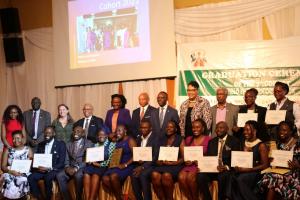WHO Supports Training of Public Health Fellows in Uganda
Kampala. Fourteen fellows from the Uganda Public Health Fellowship (PHFP) graduated, on 13th January 2023, in field epidemiology offered at the Uganda National Institute of Public Health.
The fellowship program is a partnership between the Ministry of Health (MOH), the World Health Organization (WHO), the U.S. Centers for Disease Control and Prevention (CDC), and Makerere University School of Public Health (MakSPH). This was the seventh cohort of the program.
Fellows in this cohort were placed at various sites within MOH and district health departments for practical on-the-job and field experiences. They also had a two-year intensive training in disease detection and control, conducting outbreak investigation, field epidemiology, surveillance, evaluating systems, conducting epidemiological studies, and working as front-line responders for COVID-19 and Sudan Ebola Virus outbreaks.
During their study, the fellows generated information to detect and respond to present and future health challenges and other complex emergencies.
Dr. Daniel Kyabayinze, Director of Public Health at MOH, urged the fellows to use the new skills to address Uganda's actual public health issues.
WHO and partners have been at the forefront of supporting Uganda to strengthen its public health workforce and develop its health system through provision of technical support, medical supplies, protective gear, and mentors for the programme. In this training, WHO provided oversight and quality control to the steering committee.
“It is important to keep building capacity and systems to safeguard the health of our people and mitigate the effects of pandemics and epidemics like those we have recently witnessed. Upgrading the knowledge and skills of health professionals is a significant line of defense that we can all count on,” said Dr. Yonas Tegegn Woldemariam, WHO Representative in Uganda at the graduation ceremony.
Similarly, the US CDC was instrumental in the planning, funding, and implementation of the fellowship program thus contributing to strengthening Uganda’s health system through the trained fellows.
“Beyond their impressive work with COVID-19 and on the Sudan ebolavirus response, we have seen today how this cohort worked on the important problems of blackwater fever among children, on the implementation of the hepatitis B vaccine, management of hypertension in island communities, improving mortality surveillance among adults and neonates, and many other important issues pertinent to public health in Uganda,” said Ms. Natalie Brown, US Ambassador to Uganda.
During the training, the fellows delivered numerous presentations at national and international conferences. They also published scientific papers and authored articles in local print media and peer-reviewed journals on areas of public health importance. The presentations resulted in grant acquisition and career opportunities with the UN and other organizations.
“I hope to use the knowledge and skills from the training to contribute to surveillance and control of epidemics in Uganda,” said Dr. Patience Mwine, a graduand.
Communications Associate
WHO Uganda Country Office
Email: afwcougcom [at] who.int (afwcougcom[at]who[dot]int)
Phone: +256740487734
Communications Officer
WHO Uganda
Email: tcheutchouae [at] who.int (tcheutchouae[at]who[dot]int)
